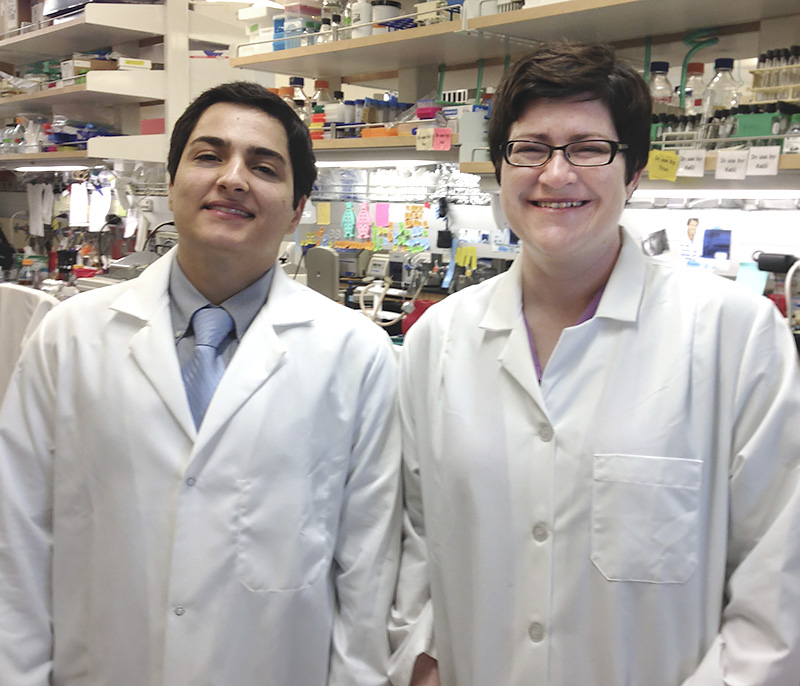
Biological sciences senior Ardalan Sharifi is working this summer in the lab with his mentor, Dr. Kelli Palmer.
While many UT Dallas undergraduates are off campus for the summer, Ardalan Sharifi, a biological sciences senior, is spending time in the lab studying the immune systems of bacteria, thanks to an American Society for Microbiology (ASM) Undergraduate Research Fellowship.
“This is a prestigious and highly competitive fellowship for undergraduates,” said Dr. Kelli Palmer, an assistant professor of biological sciences and Sharifi’s mentor. For 2014, the ASM awarded 40 of the fellowships nationwide, out of 101 applicants, according to the organization.
In addition to the ASM fellowship, Sharifi has received two other awards to support his research in Palmer’s lab, where he works in collaboration with doctoral student Valerie Price. In 2013, Sharifi was selected to participate in the Louis Stokes Alliance for Minority Participation Summer Research Academy, and he also earned an Undergraduate Research Scholar Award from the UT Dallas Office of Research.
“Ardy has earned three grants as an undergraduate, so that’s pretty amazing,” said Palmer, who has six undergraduates working in her laboratory.
The 10-week ASM summer research fellowship provides $4,000 plus travel funds for Sharifi to present his findings at the ASM national meeting in 2015.
“I like working in the lab. Practicing medicine is not just about treating patients. You also have to be careful about what drugs you prescribe. As too many antibiotic drugs are being prescribed, resistance to some of these medications is becoming more prevalent.”
Ardalan Sharifi,
a biological sciences senior
In Palmer’s laboratory, Sharifi is investigating the immune system of a bacterium called Enterococcus faecalis, which is a pathogen that colonizes the intestines of humans and animals. In humans, the bacterium can cause life-threatening infections. Palmer’s research group is studying how bacteria such as this become resistant to antibiotics and antiseptics. The complex immune system mechanism that Sharifi studies is called CRISPR-Cas.
“We’re looking at how bacteria transfer genes that confer antibiotic resistance to one another, and the role of CRISPR-Cas in that process,” Palmer said.
In addition to finding success securing research grants, Sharifi is also a published author. In research described in UT Dallas’ undergraduate research journal, The Exley, Sharifi collected samples of different “wild” species of Enterococcus bacteria from the environment and performed genetic comparisons with strains derived from human infections.
Sharifi is applying to medical schools and plans to follow in his father’s footsteps to become a physician, specializing in cardiology. He said his UT Dallas research experience has opened his eyes to additional aspects of health care.
“I like working in the lab,” he said. “Practicing medicine is not just about treating patients. You also have to be careful about what drugs you prescribe. As too many antibiotic drugs are being prescribed, resistance to some of these medications is becoming more prevalent.”